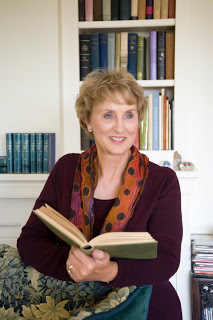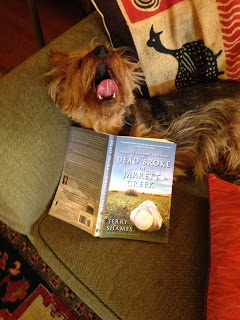Terry Shames's Blog: 7 Criminal Minds, page 226
November 25, 2015
Thankful for Writers
When I was a kid my mother once said, “Why do you like to read so much?” She was annoyed because I was one of those kids who lay around the house with a book, came to the dinner table with a book, and rode in the car with a book. I even read when I walked!
I don’t remember my answer, but it was probably something pithy like, “I just do.”
Escapism? Learning? Having a good laugh? Having a good cry? It’s all there.

(Photo by Margaretta K. Mitchell)
So on this lead-up to thanksgiving, I’m giving thanks for the writers who have made my life richer. They have described places I’ve never been and am never likely to go. They’ve introduced me to characters I would either love or hate in real life, and taught me something about what makes them tick. They’ve explained science to me in fiction and non-fiction in ways that expanded my awe of the universe I live in. They’ve made me think hard about the way I live my life and how lucky I am. And about people whose lives are blighted and who managed to rise above it or are sunk by it. They have revealed the lives of people unimaginably different from me by virtue of their skin color or their cultural heritage or their belief systems.
Hardly a day goes by when I don’t read a phrase that makes me pause and ponder: what does this really mean? Makes me wonder how the author came by such wisdom. Makes me feel awe for his or her ability to articulate something I’ve felt and could never quite describe—or something I’ve never felt, and am amazed by.
As a writer I know that people who come up with these stories that make my life richer work really hard, often with little compensation. They spend many hours alone, many hours feeling frustrated that the ideas they started out with haven’t materialized on the page. They feel afraid that they will never produce the work they set out to accomplish. They feel numb when the ideas don’t come. And yet they keep going, reaching, reaching. I salute them for their courage.
I’m thankful for writers who write deep, serious books, for those who write about history and science and psychology and travel and cooking and art. I’m thankful for those who write humor and fantasy. All of it.
And for this week’s recommendation: Young Americans, by Josh Stallings. This is a roller-coaster of a book—funny, outrageous, a zinger. It’s a caper set in the 70s, with a cast of characters you probably would be totally annoyed with in real life. But in Stalling capable hands, you’ll find yourself rooting for them the same way you do for characters in a Carl Hiaassen novel. It’s hot off the press. Enjoy.
Published on November 25, 2015 07:32
November 18, 2015
The Writer I Hope to Be
“It was only when I realized I was never going to write the book I'd dreamed of writing, nor be the writer I'd hoped to be, that I allowed myself to write the book that was in me -- to write no more, and no less, than that book.” Quote from Heather Young, written in her post entitled “The Secret of Failure” on The Debutante Ball blog, Oct 6 2015.
This was such a wise and fine quote that it got me thinking about the book I dream of writing. It isn’t as if I ever thought I was going to be the new Virginia Wolfe or P. D. James. But I always pictured the book I would write as being lively and interesting. A book worth reading.
According to my reviews, that’s what I do write. My reviews are consistently good. I get a lot of emails from fans telling me how much they love the books. So how come that isn’t enough? Why is it that I’m not quite satisfied with the good reviews? What is it that craves not just good reviews but raves?

The easy answer is that I’m ego-bound and greedy. But that doesn’t feel exactly right. Yes, I’ve got some ego involved, and yes “more” would be nice. But I think it has more to do with an internal gauge that I want to satisfy and never quite feel that I do. The good reviews and the praise from readers make me feel good, but there is a secret part of me that thinks that’s just people being nice to me. Intellectually I know that’s silly, but my creative side always thinks I can do better.
Here’s how it happens: I’ll write a scene I’m pretty happy with, but then when I go back over it, it doesn’t quite read the way I thought it did. And that happens again and again. By the time the book is finished it’s a mish-mash of all those “not quite right” scenes. All those scenes were once fresh and perfect—in my head.
I suspect that most writers have that niggling inner voice that says, “not quite.” And yet every time I start on a new book, I think, “This one! This one will be brilliant in every way.” I know that isn’t likely to happen, and yet the ideal sits out there tantalizing me. I know I should be satisfied with good enough, but I hope I never will be. That ideal is what drives me and so far it has worked well enough. And maybe next time it will take me where I want to be.
NEW:
Book Recommendation: Someone told me that she likes it when I mention good books I have read, so I’ve decided to make it a new feature of my blog. This week I’m reading In the Morning I’ll be Gone, the third in The Troubles trilogy, by Adrian McKinty. If you haven’t read them, you are missing a treat.
Published on November 18, 2015 07:11
November 11, 2015
Rich Variety of Crime Fiction
The rich variety of crime fiction
Last Saturday Northern California Sisters in Crime had our Fall Author showcase, with short readings by eight authors whose books have come out between last June and November 1. What struck me as I listened to each of them read was the incredible variety crime fiction offers.
There was a political thriller; a spine-tingling tale based on a true haunted story, a cozy—the kind of fireside story that is intriguing and entertaining without too much in the way of blood and guts; a piece of true noir fiction, a short story; a blood and guts medical thriller and a psychological thriller based on the experiences of the author, a police psychologist. In addition there were two authors who couldn’t make it, one why writes a humorous mystery and another who writes adventure mysteries. And that leaves out a dozen other sub-genres—international thrillers, spy thrillers, capers, small-town traditional mysteries, police procedurals, novels of suspense, female in jeopardy (fem-jep), romantic mysteries, private eye, literary mysteries, historical mysteries, etc.
It’s no wonder that writers submitting their work to agents and editors have trouble categorizing their work. And it’s understandable that that agents and editors tear their hair out wondering what category to dub books they are trying to find a publishing home for and that publicists despair of getting books to readers who will appreciate them. Pushing all these stories into the loose categories of thrillers vs mysteries doesn’t do them justice, and doesn’t help the reader pick out the kinds of books they like best.
It’s a wonderful smorgasbord for readers, but for writers trying to break in, it’s a conundrum. How do you describe your novel in such a way to not only intrigue and agent or editor, but give them some idea of how to market it. That’s a good reason to keep up with what’s selling. You may have written a perfectly wonderful female detective book, but if female detectives are not popular at the moment, you’re out of luck.
Unless, that is, you use creative labeling. If you know that the female private eye market is saturated, think of another aspect of the book that you can point to. Is there a romance in the book? Are romantic suspense novels all the rage? Call it romantic suspense. Spy novels dead in the water? Call it international suspense. Paranormal not selling? Emphasize the detective called in to solve it, and call it a police procedural.
This isn’t a way to cheat. It’s a way to help your agent or editor sell it to the decision-makers. And it’s a way to get your books to the readers who appreciate them.
Last Saturday Northern California Sisters in Crime had our Fall Author showcase, with short readings by eight authors whose books have come out between last June and November 1. What struck me as I listened to each of them read was the incredible variety crime fiction offers.
There was a political thriller; a spine-tingling tale based on a true haunted story, a cozy—the kind of fireside story that is intriguing and entertaining without too much in the way of blood and guts; a piece of true noir fiction, a short story; a blood and guts medical thriller and a psychological thriller based on the experiences of the author, a police psychologist. In addition there were two authors who couldn’t make it, one why writes a humorous mystery and another who writes adventure mysteries. And that leaves out a dozen other sub-genres—international thrillers, spy thrillers, capers, small-town traditional mysteries, police procedurals, novels of suspense, female in jeopardy (fem-jep), romantic mysteries, private eye, literary mysteries, historical mysteries, etc.
It’s no wonder that writers submitting their work to agents and editors have trouble categorizing their work. And it’s understandable that that agents and editors tear their hair out wondering what category to dub books they are trying to find a publishing home for and that publicists despair of getting books to readers who will appreciate them. Pushing all these stories into the loose categories of thrillers vs mysteries doesn’t do them justice, and doesn’t help the reader pick out the kinds of books they like best.
It’s a wonderful smorgasbord for readers, but for writers trying to break in, it’s a conundrum. How do you describe your novel in such a way to not only intrigue and agent or editor, but give them some idea of how to market it. That’s a good reason to keep up with what’s selling. You may have written a perfectly wonderful female detective book, but if female detectives are not popular at the moment, you’re out of luck.
Unless, that is, you use creative labeling. If you know that the female private eye market is saturated, think of another aspect of the book that you can point to. Is there a romance in the book? Are romantic suspense novels all the rage? Call it romantic suspense. Spy novels dead in the water? Call it international suspense. Paranormal not selling? Emphasize the detective called in to solve it, and call it a police procedural.
This isn’t a way to cheat. It’s a way to help your agent or editor sell it to the decision-makers. And it’s a way to get your books to the readers who appreciate them.
Published on November 11, 2015 07:35
November 4, 2015
Every Month is NANoWriMo

I’ve never officially participated in National November Writing Month. It sounds like a wonderful club to be part of, and I always give a virtual high-five to those who sign up for it. So why am I not in that club? Because for me every month is Writing Month. People often say I’ m very prolific, and there’s a reason for that. I write a lot.
When I had a full-time job, I wrote during lunch and after work. I wrote my first full novel by vowing that I would come home from work and write five pages a day, no matter how late I had to stay up. I once lived next door to a man who worked full time and had a family. He got up an hour early every morning to write. I don’t know how it worked out for him—if he ever wrote his novel—but I admired his dedication.
The story is that Mary Higgins Clark was left a young widow with four children. Working on a secretary’s salary, she knew she was in trouble. So she got up early every morning to write. Judy Greber used to bribe her young boys to give her writing time. Sophie Littlefield said her friends couldn’t understand why she wouldn’t go for a spa day with them or go out to lunch: she had a novel to write. We all know how those stories worked out.
I don’t mean you have to give up a social life to be an author. But I do mean you have to be serious enough to choose your social life wisely. I’m grateful for friends who know that when I disappear for days at a time and can’t go to lunch and am often distracted it means I’m writing. I recently went to a talk with two authors who are a couple. They talked about how nice it was to live with someone who understood that when you were looking out the window for an hour, it didn’t mean you weren’t working.
When I’m working on a first draft, I set myself the goal of writing 2,000 words a day. Every day. I know that sounds like a lot, but I’ve heard a couple of very successful authors say that for them it’s 5,000 words. Yeah, that means in their world I’m a slacker. These are not beautiful, perfect, or even acceptable words, but they give me something to work with. I’ve had people tell me they can’t go onto the next scene until they’ve perfected the one before. That probably works for some people, but more often than not, it means they’ve written the first sixty pages or so and have never gone beyond that.
That’s where NaNoWriMo comes in. People force themselves to write enough words every day to have 50,000 words by the end of the month. It’s a good exercise. I know, because for me any month can be November.
Published on November 04, 2015 06:51
October 28, 2015
Inspiration
I just finished reading a crime fiction book that made me want to write something really good. The language was rich, the story solid and a little scary, and the characters deeply human. But what really grabbed me was that the book had depth and soul. It had at heart a sense of morality.
I was thinking about what inspires me not just to write, but to write a better book, like that one, to reach inside to what I really think is important and mix it into a story in such a way that makes me proud of what I’ve written.
For years all I wanted was to tell a story good enough to get published. Now I realize that I was not being true to myself and certainly not working to my highest aspirations. There’s a huge gulf between “good enough” and “good.” More and more I think about how to bridge that gulf.
I’ve read and enjoyed plenty of books that were good enough. I don’t require that every book I read be the best example of art and craft in its category. So what is it that gets into me and makes me want to go beyond what I think of as simple entertainment and to write an inspired book?
I don’t think it’s the desire to be famous, or rich. There are plenty of rich and famous authors whose books I don’t admire at all. And some little known authors whose work I have tremendous respect for. Also, I don’t always feel the drive to step it up. Sometimes just writing a good, solid book is fine.
Does the drive come from competition? I doubt that as well. For some reason anytime I read Truman Capote, I feel the inspiration to do better. But imagining that I could compete with him would be plain foolish.
I think in some way it has to do with the reason we write to begin with—the desire to connect. I want to write stories that make people recognize their world in my prose—to recognize themselves and people they know, and to recognize the dilemmas we all face , whether we do it with courage or cowardice. I want readers to feel that the time they spend reading my books is not throwaway time, but hours well spent. I want them to remember little bits of things and recognize the human condition common to all of us.
John Gardiner wrote an entire book, On Moral Fiction, in which he addressed some of what I’m talking about. I fear that he would have sneered at my desire to write “moral” crime fiction. His was a more high-fallutin’ world. But when I read the work of some of the best crime writers I know that the best writing transcends genre—and inspires me to do the same.
Published on October 28, 2015 06:29
October 21, 2015
Taking a Break
Everyone needs a break now and then, and this week I am in Tahoe with my sister and a friend. It's a quiet time of year here in this resort area. Too cold for summer sports and as yet there is no snow. So instead of sitting in traffic due to treacherous weather conditions, or because the summer crowd has packed in, we had little traffic to contend with. As you can see, the leaves are turning yellow and orange.


Today it was windy and cloudy at the lake


But I enjoyed myself enormously and feel like it was worth the trip.


But folks, even if I am in Tahoe relaxing, enjoying the scenery, napping, drinking a little wine, and going for walks.....I edited twenty-five pages today.
Tomorrow is another day, and now we are going out for pizza! I'll be back on the job next week.


Today it was windy and cloudy at the lake


But I enjoyed myself enormously and feel like it was worth the trip.


But folks, even if I am in Tahoe relaxing, enjoying the scenery, napping, drinking a little wine, and going for walks.....I edited twenty-five pages today.
Tomorrow is another day, and now we are going out for pizza! I'll be back on the job next week.
Published on October 21, 2015 06:48
October 14, 2015
I'm Buzzing

Last night I asked my book club if they had ever read Tim Hallinan’s books. Some of them are not mystery readers, but I told them that Tim’s books are up there with some of the great “literary” genre writers—John LeCarre, Dennis Lehane, and Alice Sebold, to name a few. These are writers who fully embrace the mystery genre, but who add a philosophical and lyrical depth that many writers of genre fiction don’t strive for. A few of the women wrote down his name. That’s the sort of thing that creates buzz.
I hardly ever get off an airplane or leave a social event without having recommended books to people. If someone asks me what I write, I tell them and try to be aware if their eyes glaze over. If that happens, I ask what they like to read, and take the opportunity to tell them about books they may like. If someone likes cozies I’ll tell them about Rhys Bowen or Tracy Weber or Leslie Budewicz. Thrillers? I recommend Gayle Lynds or Marc Cameron, or Mark Greanley—I was just on a panel with them at Bouchercon and thoroughly enjoyed each of their books.
Do you like thrillers with a touch of sci-fi? Patrick Lee—what an imagination the guy has! Or there is always The Martian. I’m amazed that there are still people who never heard of it.
And I’m always keen to slip in a word for my fellow-writers at Seventh Street Books. Lori Rader-Day writes a solid mystery in the great tradition of whodunits—and has a fresh new Anthony award to prove it. James Ziskin writes a “historical” series (who knew the 1960s were historical?) from the viewpoint of a young female reporter—and has an Anthony nomination as well. Allen Eskens is a multiple award winner. I loved his first book and can’t wait to read his second.
One in particular that I want to buzz you with is a chilling psychological thriller that just came out—The Hollow Man, by Mark Pryor. Pryor writes a wonderful, gentlemanly series set in Europe with a diplomatic corps protagonist. The Hollow Man couldn’t be farther from this. It is about a sociopath who realizes something is missing in his psyche and has worked hard to fit in. When something in his life goes awry, his true nature is revealed. It’s a great read, and I highly recommend it. Will this little bit of buzz matter? Who knows? All I can do is tell people about the books I like.
I don’t know how word of mouth propels one good book and never catches with one equally as good. Most writers despair of this strange algorithm. I recently read a Macavity award-winning author whose book blew me away, and someone told me that not everyone loved the book. On the flip side, I have stopped reading a few popular books midway through because they simply didn’t engage me.
I’m itching to talk about books that I’ve been asked to blurb and that will come out in the spring—but that will wait for another posting. Happy reading, everyone!
Published on October 14, 2015 08:47
October 7, 2015
The Desire to Hurry
I thought by now I’d be done with the thriller I started writing a year ago last June. In part it isn’t all my fault. I had a problem with shoulder surgery this summer that set back my writing. But that’s only part of the problem—if there even is a problem.
I’m impatient. That’s a given. I know I’m not the only one who wants to hurry along the process of creating a book, but I may be one of the worst. But at some point I’ve had to realize that being impatient does not serve me well as a writer.

Here’s how impatience shows up. I have a germ of an idea for a plot, and characters begin to step up. I write a few chapters and they go along nicely.
Then, after a while, I feel really satisfied because I have 50,000 words that seem to have sprung from nowhere. I’m pretty sure things are going to roar along. That’s when I make my mistake. I decide to read what I’ve got—after all, I’m way over halfway done. I settle in for a good read…and it’s awful. The plot I thought was pretty good turns out to have ghastly holes that I’m not sure I’ll be able to fix. Every single character sounds like ones I’ve read before. I know at that point that I was kidding myself—that this was a terrible idea for a book, that I’ll never finish it—in fact, maybe it’s time to stop writing and become a….well, anything but a writer.
What to do?? Do I plow forward, hoping by some miracle that it will all come together and make sense? Do I go back to the beginning and start reworking what you’ve got, shoring up the plot, fluffing up the characters? Do I have someone I trust read it, hoping it isn’t as bad as I think? Or do I abandon the whole thing?
I’ve tried each of these solutions, and the only one that works for me is to slog forward, setting a daily word count for myself. I remind myself that a beginning draft is an exploration, not an opportunity to write down finished thoughts. And somewhere along the line, the characters rescue me. They wake up, yawn, introduce themselves to me and tell me how the plot should actually unfold.
The trouble is, this takes time. I can rush it to a certain extent, but the process is the process.
When I finish, then it’s time to start all over with that notorious process called editing. I try to remember what I had in mind from the beginning. I begin to understand what the plot holes are and how they have to be plugged. More often than not, it’s because I haven’t actually fleshed out the characters and without characters the plot points don’t come to life. With that in mind, I let the characters evolve into their potential, honing the plot, filling in the setting so that it reflects the characters and plots…
Finally I am finished…again. And this time I have what is a real first draft. It needs more work. And I want more than anything for the damn book to be done. I want to hurry it along because I want to see the whole thing be what I envisioned when you started out. I want to present it to my agent. I want people to read it. Not only that, but I have another book tugging at the back of I mind.
But it won’t do to hurry, no matter how much I want to move along. If I am going to be true to the original vision, I have to keep going over it—sharpening, filling in, exploring side issues, doing final bits of research. Without all this work, what I have is just a shadow of the book I thought I was going to write.
It would be nice to have a magic wand that I could wave and have it all turn out the way I wanted, but that’s not the way it works. At least not yet. If anyone is holding that magic wand, pass it over!
Published on October 07, 2015 06:52
September 30, 2015
What happened?
Here are some prickly questions that crop up and that I don't have good answers for:

1) We’ve all read them-books that start out with a great premise, interesting characters, intriguing setting…and then the book runs off the rails. So what happened? I’m pretty sure that the author didn’t say “oh good, I’m done, I’ll just write anything from here on to the end. And I’m also pretty sure the publisher doesn’t stop reading and say, “okay, we’ve hooked the reader, who cares what happens next?” So what did happen?
2) You have a great idea for a book. You are super-excited. You start writing and the story roars along. The characters are alive, the plot thrills you. Every time you sit down at the computer, your heart is racing with excitement. And then one day you stall out. The plot seems silly, the characters empty. You try for a while to resurrect your enthusiasm. You take advice about how to move forward, but the book feels dead. Eventually you decide it’s better to put it away in favor of something else. What happened?
3) You pick up a book in your favorite genre, one that everyone likes, and for you it falls flat. You keep reading, hoping to discover the magic that has enchanted everyone else, and by the time you finish it, you are shaking your head, wondering if it’s you are “them.”
4) You pick up a book that all your friends made fun of and you love it. You find a sly wit at work, the characters remind you of people you know. Your imagination is sparked and you can’t wait to read other books by this author.
5) In your writer’s group there is an author who has worked for years and has written a couple of books you think are terrific—and the writer can’t find an agent or a publisher. On the other hand, the person in the group who has just dashed off what you secretly think is pretty thin stuff comes in with a glowing report that she has just landed a three-book contract. Not that you begrudge her good fortune, but you can’t help wondering what gives.
There are a number of ways to answer each of these questions, but the common denominator is that tastes differ. What speaks to one person doesn’t necessarily grab another. In fact, what may have initially grabbed you about something you were writing may not have what it takes to go the distance. One of the hardest things any writer has to learn is that not everybody is going to like your work—including you. And as a reader, not everyone is going to adore your favorite books and authors.
I’d love for readers to share your ideas about what happened.
Published on September 30, 2015 06:44
September 23, 2015
Could a writer do what her characters do?
Could you do what your characters do?
The detective is shot in the leg. He can’t stop now, he’s got to get to the woman he loves and save her from the smooth, sweet-talking bad guy who will fool her and take her away and…. He rips his shirt off, binds the wound and hobbles toward his car. Within twenty minutes he is outside the house where she is being held. Miraculously his leg is well enough to…
Or how about this: The female police detective knows something bad is going on. She isn’t allowed to get in to the local FBI headquarters, so if she’s going to get to the bottom of the story, she has to sneak into the facility. She watches and waits. It’s cold and raining. She’s shivering and exhausted. Finally she sees someone coming out of the building, someone who has been working late. She runs toward the building, jacket over her head as if desperate to get out of the rain. The man leaving is so chivalrous he holds the door open so she can scurry inside. Now she’s inside and she has to find the room that holds the files…

Pretty exciting stuff. But where does it come from? Is this something a writer or a reader could ever think of doing in real life? Ever? What makes writers want to put our characters in dire straits and have them perform in ways we never could? What makes readers want to read about it?
I love action scenes, but as a reader, I can’t picture myself in the action. I know I’m a total wuss and could never find the courage to go after bad guys. I can’t imagine how I would get out of big trouble. As bad as reading about someone who is in a physical confrontation is reading about someone who is trapped. I know if that happened to me that if I didn’t die of fear, I’d have to be institutionalized afterwards because I’d lose my mind.
I’m pretty sure I read these types of books in order to make myself think everything will be okay. I have a real life example. My husband loves sailing, bigtime. I like it okay but was terrified at the idea of going on an ocean voyage and being out of sight of land. Then I read a true story about a woman who ROWED across the Atlantic alone. Next time there was a chance for me to go on a trip where we’d be out of sight of land, I said “I’m in.” If told she could do something like that, I could spend a few hours away from land.
But why do I write stories like that? ? Well, I actually don’t. I write the kinds of books where people have to solve crimes by deduction in an environment where my protagonist knows people’s strengths and weaknesses and is never in real danger. Like I said, I’m a wuss. I read books by writers that I know have never been in the kind of peril they imagine for their characters. So here’s my question: Do they imagine themselves in those situations, and do they think they could do what their characters do?
The detective is shot in the leg. He can’t stop now, he’s got to get to the woman he loves and save her from the smooth, sweet-talking bad guy who will fool her and take her away and…. He rips his shirt off, binds the wound and hobbles toward his car. Within twenty minutes he is outside the house where she is being held. Miraculously his leg is well enough to…
Or how about this: The female police detective knows something bad is going on. She isn’t allowed to get in to the local FBI headquarters, so if she’s going to get to the bottom of the story, she has to sneak into the facility. She watches and waits. It’s cold and raining. She’s shivering and exhausted. Finally she sees someone coming out of the building, someone who has been working late. She runs toward the building, jacket over her head as if desperate to get out of the rain. The man leaving is so chivalrous he holds the door open so she can scurry inside. Now she’s inside and she has to find the room that holds the files…

Pretty exciting stuff. But where does it come from? Is this something a writer or a reader could ever think of doing in real life? Ever? What makes writers want to put our characters in dire straits and have them perform in ways we never could? What makes readers want to read about it?
I love action scenes, but as a reader, I can’t picture myself in the action. I know I’m a total wuss and could never find the courage to go after bad guys. I can’t imagine how I would get out of big trouble. As bad as reading about someone who is in a physical confrontation is reading about someone who is trapped. I know if that happened to me that if I didn’t die of fear, I’d have to be institutionalized afterwards because I’d lose my mind.
I’m pretty sure I read these types of books in order to make myself think everything will be okay. I have a real life example. My husband loves sailing, bigtime. I like it okay but was terrified at the idea of going on an ocean voyage and being out of sight of land. Then I read a true story about a woman who ROWED across the Atlantic alone. Next time there was a chance for me to go on a trip where we’d be out of sight of land, I said “I’m in.” If told she could do something like that, I could spend a few hours away from land.
But why do I write stories like that? ? Well, I actually don’t. I write the kinds of books where people have to solve crimes by deduction in an environment where my protagonist knows people’s strengths and weaknesses and is never in real danger. Like I said, I’m a wuss. I read books by writers that I know have never been in the kind of peril they imagine for their characters. So here’s my question: Do they imagine themselves in those situations, and do they think they could do what their characters do?
Published on September 23, 2015 07:15
7 Criminal Minds
A collection of 10 writers who post every other week. A new topic is offered every week.
- Terry Shames's profile
- 273 followers



